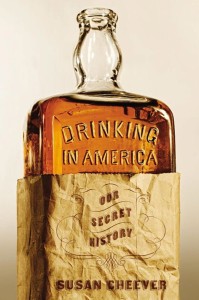 Not only has alcohol been intimately involved in the history of the United States of America, it has been closely associated with some of the key moments in that history, from the very beginning. That’s the argument that Susan Cheever makes in her book Drinking in America: Our Secret History.
Not only has alcohol been intimately involved in the history of the United States of America, it has been closely associated with some of the key moments in that history, from the very beginning. That’s the argument that Susan Cheever makes in her book Drinking in America: Our Secret History.
It’s an apt title, and a subtle wordplay. (Which is altogether appropriate, for Cheever is the daughter of the great American wordsmith John Cheever, whose writing gene she apparently inherited along with the one for alcoholism.) It’s not the drinking that’s been a secret in American history. Drinking is often secret within families, but in American history it has been flagrantly out in the open. No, what Cheever is saying is that the way drinking has influenced our history is the secret hidden in plain sight.
Cheever hits some of the high points of America’s long history with drinking alcohol, some of which are well known, some less so. There is of course the Whiskey Rebellion and the role alcohol played in the defeat of the American Indians, and the settling of the West. And the temperance crusades and Prohibition, and repeal.
But some of the best chapters deal with the lesser-known bits of America’s drinking history. The Pilgrims were supposed to land in Virginia but instead came ashore in New England; they decided to stay, Cheever writes, because the Mayflower was running short on beer. America’s Revolution was fomented by men who met almost exclusively in taverns, which from the first days of the new colonies were often a town or city’s only meeting places. Paul Revere, Ethan Allen and other Revolutionary heroes may have gotten much of their courage from a bottle, as did the patriots who faced down a much larger British force on Lexington Green. And so on.
But talk about disillusionment! Now from Susan Cheever I find out that one of my childhood heroes, Johnny Appleseed, was planting all those apple trees for people to make cider with, not to eat! The kind of apples that would have grown from seed were small, hard and very tart, but made good cider (and applejack), one of the few things that made life on the frontier barely tolerable.
Cheever traces the pendulum swings of America’s relationship with alcohol, from nearly universal besottedness by the 1830s, through a gradual drying out through the remainder of the 19th century leading up to Prohibition, then another upswing during the Roaring ’20s to a peak in the 1950s and ’60s, then moving in ever-quicker swings to the present day.
What changed after the 1830s, she says, was a growing love affair with money that replaced the love of alcohol. Drunken workers wasted time and money, so people began to take “the pledge.” “The first temperance groups were secular and calm,” Cheever writes. “Their purpose was to help men hang on to their paychecks and their dignity. But America is not a calm nation…”
And she touches on the common knowledge that a great proportion of our great writers have been alcoholics, bursting that bubble by pointing out that it was really only the writers of a couple of generations, those who came up during and between the two World Wars, like her father.
She goes on to posit, however, that drinking may have played a role that has been ignored in some of the political crises of the second half of the 20th century, including McCarthyism, the assassination of President Kennedy, and the downfall of President Nixon. Potentially controversial claims, which she backs up persuasively with documentation and logic.
Drinking in America is not a chronicle of what Americans drank, and when, and how much. It’s a sober look at the effect that drinking has had on our national character and our history itself. She sees us heading into yet another period when laws are strengthened to discourage consumption of alcohol. It’s a tendency she warns against. “Educating Americans about drinking is a good idea, but outlawing drinking is a bad idea. Prohibition did not work in 1920 and it will not work now.”
You can hear an interesting and entertaining interview with Cheever on the website of WBUR, Boston’s public radio station.
(Twelve Books, 2015 – paper 2016)
